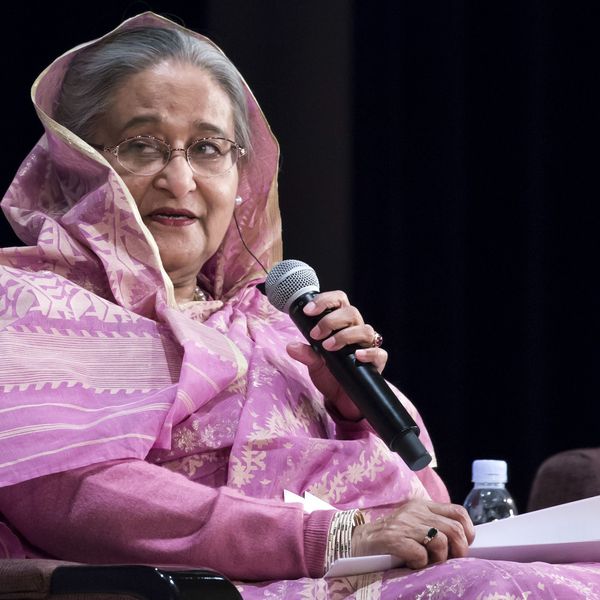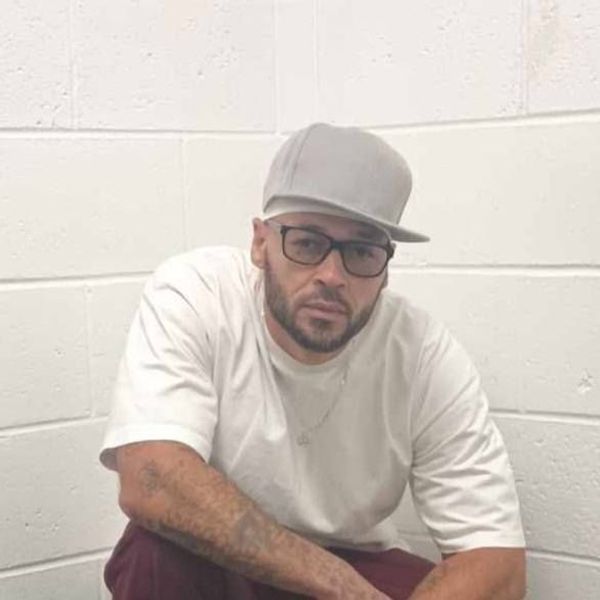In 'Cruel and Inhuman' Verdict, Dzhokhar Tsarnaev Sentenced to Death
'The death penalty is not justice,' says Amnesty International. 'It will only compound the violence, and it will not deter others from committing similar crimes in the future.'
A federal jury sentenced Dzhokhar Tsarnaev to death on Friday. The 21-year-old was convicted last month of 30 charges stemming from his role in the Boston Marathon bombing.
The jury of seven women and five men took 14 and a half hours over three days to render its decision.
According to the Boston Globe, because he was sentenced to death, Tsarnaev will likely be brought to the federal prison at Terre Haute, Ind., where the Bureau of Prisons holds inmates on Death Row.
The Globe also notes that Tsarnaev "will likely engage in a lengthy appeals process that will mirror the complexity of his trial. He will likely appeal several of O'Toole's decisions in the case, including the judge's refusal to relocate the trial to a court outside Boston."
In the wake of the decision, groups opposed to capital punishment voiced disappointment.
The ACLU of Massachusetts said in a statement:
Today's verdict does not reflect the values of the majority of people in our Commonwealth. The ACLU of Massachusetts has been disappointed from the start that the federal government sought the death penalty in Massachusetts, which has rejected capital punishment. The last execution in the state of Massachusetts took place in 1947. Even in this case, Massachusetts opposition to the death penalty has been reflected in public opinion polls, in the pleas of religious leaders, and in statements by victims' families and survivors. In a Boston Globe poll conducted this April, Massachusetts residents--by a four-to-one margin--overwhelmingly opposed the imposition of a death sentence for Dzhokhar Tsarnaev. Massachusetts religious leaders voiced their opposition to seeking his execution. Victims' families and survivors in this case asked that federal prosecutors take the death penalty off the table and, instead, accept a sentence of life in exchange for no possibility of appeal or parole. This verdict is an outlier, and does not change the fact that Americans increasingly reject capital punishment.
And Steven Hawkins, executive director of Amnesty International USA, declared:
We condemn the bombings that took place in Boston two years ago, and we mourn the loss of life and grave injuries they caused. The death penalty, however, is not justice. It will only compound the violence, and it will not deter others from committing similar crimes in the future.
It is outrageous that the federal government imposes this cruel and inhuman punishment, particularly when the people of Massachusetts have abolished it in their state. As death sentences decline worldwide, no government can claim to be a leader in human rights when it sentences its prisoners to death.
An Urgent Message From Our Co-Founder
Dear Common Dreams reader, The U.S. is on a fast track to authoritarianism like nothing I've ever seen. Meanwhile, corporate news outlets are utterly capitulating to Trump, twisting their coverage to avoid drawing his ire while lining up to stuff cash in his pockets. That's why I believe that Common Dreams is doing the best and most consequential reporting that we've ever done. Our small but mighty team is a progressive reporting powerhouse, covering the news every day that the corporate media never will. Our mission has always been simple: To inform. To inspire. And to ignite change for the common good. Now here's the key piece that I want all our readers to understand: None of this would be possible without your financial support. That's not just some fundraising cliche. It's the absolute and literal truth. We don't accept corporate advertising and never will. We don't have a paywall because we don't think people should be blocked from critical news based on their ability to pay. Everything we do is funded by the donations of readers like you. Will you donate now to help power the nonprofit, independent reporting of Common Dreams? Thank you for being a vital member of our community. Together, we can keep independent journalism alive when it’s needed most. - Craig Brown, Co-founder |
A federal jury sentenced Dzhokhar Tsarnaev to death on Friday. The 21-year-old was convicted last month of 30 charges stemming from his role in the Boston Marathon bombing.
The jury of seven women and five men took 14 and a half hours over three days to render its decision.
According to the Boston Globe, because he was sentenced to death, Tsarnaev will likely be brought to the federal prison at Terre Haute, Ind., where the Bureau of Prisons holds inmates on Death Row.
The Globe also notes that Tsarnaev "will likely engage in a lengthy appeals process that will mirror the complexity of his trial. He will likely appeal several of O'Toole's decisions in the case, including the judge's refusal to relocate the trial to a court outside Boston."
In the wake of the decision, groups opposed to capital punishment voiced disappointment.
The ACLU of Massachusetts said in a statement:
Today's verdict does not reflect the values of the majority of people in our Commonwealth. The ACLU of Massachusetts has been disappointed from the start that the federal government sought the death penalty in Massachusetts, which has rejected capital punishment. The last execution in the state of Massachusetts took place in 1947. Even in this case, Massachusetts opposition to the death penalty has been reflected in public opinion polls, in the pleas of religious leaders, and in statements by victims' families and survivors. In a Boston Globe poll conducted this April, Massachusetts residents--by a four-to-one margin--overwhelmingly opposed the imposition of a death sentence for Dzhokhar Tsarnaev. Massachusetts religious leaders voiced their opposition to seeking his execution. Victims' families and survivors in this case asked that federal prosecutors take the death penalty off the table and, instead, accept a sentence of life in exchange for no possibility of appeal or parole. This verdict is an outlier, and does not change the fact that Americans increasingly reject capital punishment.
And Steven Hawkins, executive director of Amnesty International USA, declared:
We condemn the bombings that took place in Boston two years ago, and we mourn the loss of life and grave injuries they caused. The death penalty, however, is not justice. It will only compound the violence, and it will not deter others from committing similar crimes in the future.
It is outrageous that the federal government imposes this cruel and inhuman punishment, particularly when the people of Massachusetts have abolished it in their state. As death sentences decline worldwide, no government can claim to be a leader in human rights when it sentences its prisoners to death.
A federal jury sentenced Dzhokhar Tsarnaev to death on Friday. The 21-year-old was convicted last month of 30 charges stemming from his role in the Boston Marathon bombing.
The jury of seven women and five men took 14 and a half hours over three days to render its decision.
According to the Boston Globe, because he was sentenced to death, Tsarnaev will likely be brought to the federal prison at Terre Haute, Ind., where the Bureau of Prisons holds inmates on Death Row.
The Globe also notes that Tsarnaev "will likely engage in a lengthy appeals process that will mirror the complexity of his trial. He will likely appeal several of O'Toole's decisions in the case, including the judge's refusal to relocate the trial to a court outside Boston."
In the wake of the decision, groups opposed to capital punishment voiced disappointment.
The ACLU of Massachusetts said in a statement:
Today's verdict does not reflect the values of the majority of people in our Commonwealth. The ACLU of Massachusetts has been disappointed from the start that the federal government sought the death penalty in Massachusetts, which has rejected capital punishment. The last execution in the state of Massachusetts took place in 1947. Even in this case, Massachusetts opposition to the death penalty has been reflected in public opinion polls, in the pleas of religious leaders, and in statements by victims' families and survivors. In a Boston Globe poll conducted this April, Massachusetts residents--by a four-to-one margin--overwhelmingly opposed the imposition of a death sentence for Dzhokhar Tsarnaev. Massachusetts religious leaders voiced their opposition to seeking his execution. Victims' families and survivors in this case asked that federal prosecutors take the death penalty off the table and, instead, accept a sentence of life in exchange for no possibility of appeal or parole. This verdict is an outlier, and does not change the fact that Americans increasingly reject capital punishment.
And Steven Hawkins, executive director of Amnesty International USA, declared:
We condemn the bombings that took place in Boston two years ago, and we mourn the loss of life and grave injuries they caused. The death penalty, however, is not justice. It will only compound the violence, and it will not deter others from committing similar crimes in the future.
It is outrageous that the federal government imposes this cruel and inhuman punishment, particularly when the people of Massachusetts have abolished it in their state. As death sentences decline worldwide, no government can claim to be a leader in human rights when it sentences its prisoners to death.

